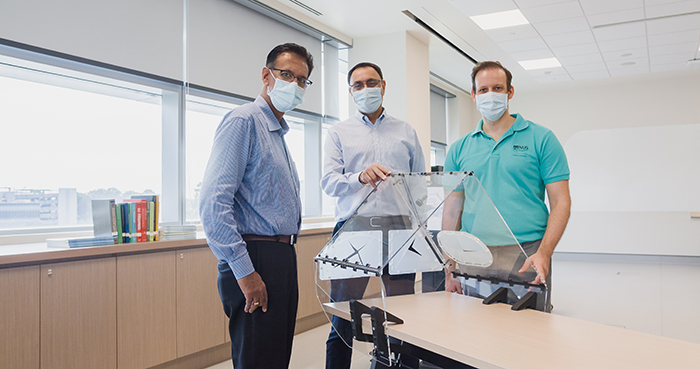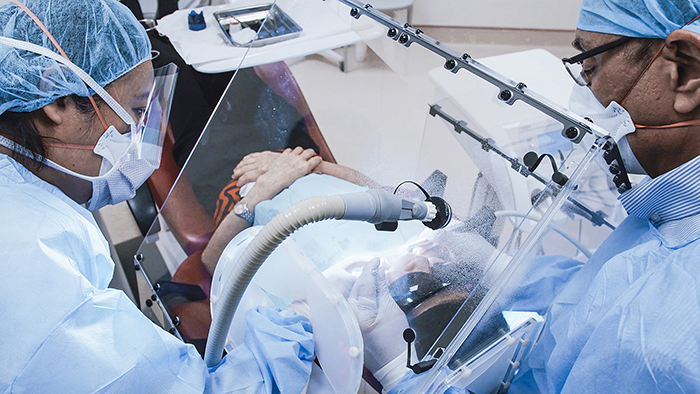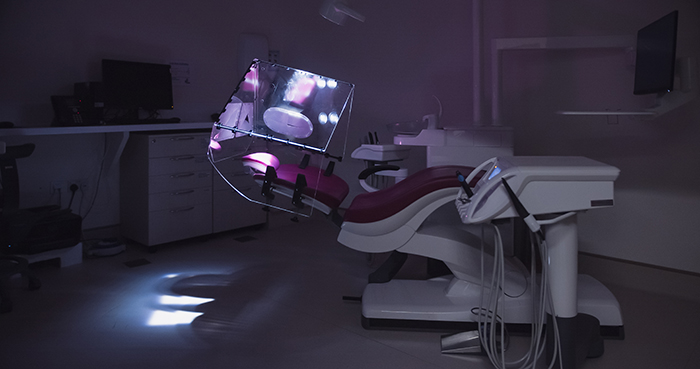Providing Safe Dental Care During COVID-19
Our researchers developed a Dental Droplet and Aerosol Reducing Tent (Dental DART) to ensure dentists could proceed with optimum dental care treatment amidst the pandemic.
As COVID-19 continues to have massive and unpredictable implications on public health in the long run, it is critical to normalise its prevention and control and ensure optimum dental care treatment is offered without compromising on the safety of patients and dental professionals.
To minimise transmission of infection between patients and dental healthcare personnel and vice versa, researchers at the National University of Singapore (NUS) jointly developed a portable tent-like shield to be used during dental treatment. Named the ‘Dental Droplet and Aerosol Reducing Tent (Dental DART)’, the device aims to limit and potentially prevent the spread of infectious agents from patients via air, aerosols, and droplets.

The DART is first placed around the patient’s head to reduce the risk of contamination. Dentists can safely perform dental procedures through three access ports while vacuum pumps from dental chairs are attached to the tent to remove contaminated air into the scavenging system. This enables dentists to continue providing safe dental care during the pandemic while prioritising patients’ and their own well-being.
“The Dental DART is a design evolution and has been prepared to protect dentists and their patients from potential infectious agents present in the aerosols generated during dental procedures,” said Professor Freddy Boey, NUS Deputy President (Innovation & Enterprise) and lead researcher for this project.
“Personal protective equipment, or PPE, can be infected after exposure to aerosols from dental procedures. The use of the Dental DART can decrease the PPE exposure to aerosols and prevent further environmental contamination at the time the clinicians remove their arms, hands, and instruments from the tent,” added Associate Professor Vinicius Rosa, who is from the NUS Faculty of Dentistry and a co-inventor of the device.

The DART has been tested in a clinical setting during scaling procedures – which are known to increase air contamination significantly – and it was found that there was no increase in viable bacteria on the surface of the dental chair as well as on the dentist’s face. Without the DART, the risk of contamination increases by almost 14 times.
The findings demonstrate that the DART can successfully extract and contain particles using an extraction valve, shielding medical professionals from aerosol exposure. Additionally, it reduces the likelihood of cross-contamination and potential illnesses in clinics by preventing the transmission of microbes and viruses onto clinical surfaces. When patients test positive for COVID-19 or other serious transmissible infectious diseases, the design can be used to protect clinical staff in a variety of situations. This helps to make the dental clinical setting safer and lessen the stress and psychological suffering that might occur through the massive spread of highly contagious diseases.

While the DART was developed during the COVID-19 pandemic, the inventors have filed a patent for its design and are looking to collaborate with healthcare and industry partners to offer this device globally. This will go beyond COVID-19 to provide safe dental care for patients while preventing the spread of other highly infectious diseases.

